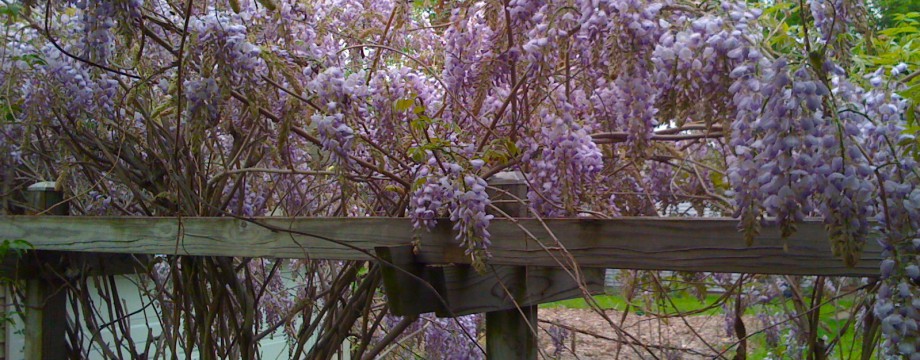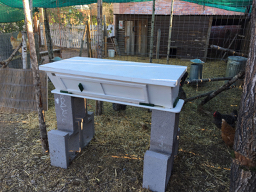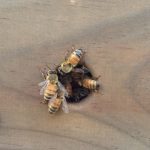A homestead needs farm animals. That can be a bit of a problem for a city homestead. One can have dogs or cats, but, here in my city, there are rules and there are ordinances.That means, much as I would like to have my own fresh eggs, I can’t keep chickens. Ever since I went hiking with a friend and his goats, I have wanted to have a couple of goats. With goats, I could try making cheese. And if they were Angora goats, I would also have wonderful mohair fiber to spin. But, alas, I can’t have goats. So what is a city homesteader to do? My answer: honey bees!
This summer I got a beehive and a colony of honey bees. I had been thinking of getting bees for a couple of years, but somehow just didn’t get around to getting set up. In June I went to the Midwest Renewable Energy Fair and fell in love with the design of a top bar beehive.
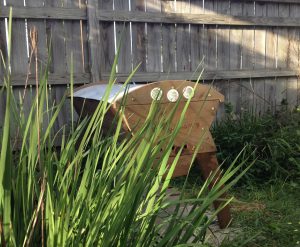 With a top bar beehive, the bees build comb downwards from the bar in shapes of (mostly) their own choosing (they are, after all, constrained by the sides, top and bottom of the hive box). Though each of the cells is the usual hexagon, the sizes of individual cells varies and the combs themselves are wonderfully shaped in organic undulations. I’ve seen how these comb shapes get started, with bee hanging onto bee, like trapeze artists, to form what I assume to be a catenary shape. My top bar hive has windows on either side so that I can see the hundreds of bees that live inside doing all manner of bee tasks.
With a top bar beehive, the bees build comb downwards from the bar in shapes of (mostly) their own choosing (they are, after all, constrained by the sides, top and bottom of the hive box). Though each of the cells is the usual hexagon, the sizes of individual cells varies and the combs themselves are wonderfully shaped in organic undulations. I’ve seen how these comb shapes get started, with bee hanging onto bee, like trapeze artists, to form what I assume to be a catenary shape. My top bar hive has windows on either side so that I can see the hundreds of bees that live inside doing all manner of bee tasks.
As fall approaches, during the warmer, sunnier days, my bees are working away, storing up honey for the winter. I worry about them. Will they have enough honey to feed themselves for the entire winter? Now evening temperatures are dropping and I am seeing less and less activity. They huddle together inside the hive. Is it too cold for them? Will they survive? What should I plant next spring that they will like to feed on? Are they happy? It is remarkable how attached I am getting to my little colony of bees. I want them to live and thrive.
Now that I have bees, I am more and more aware of how many other people in Goshen also have bees. Some are longtime beekeepers; others have just started tending to bees in the last couple of years. I am glad to see that. Honey bees are remarkable creatures. They work for the good of the entire colony. They pollinate our flowers and our crops. They create that wonderful nectar we call honey.
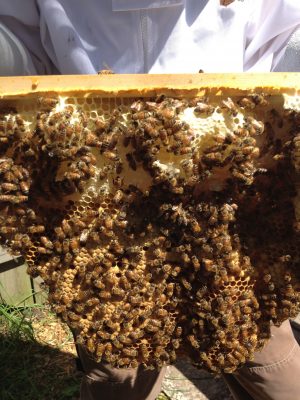 So I suppose I am now a beekeeper. But I really don’t like that name. Because, really, I am not “keeping” the bees. True, I did get them from somewhere, so I did impose my will on them, uprooting the colony from wherever it had initially made its home. But now, what I want, is not to keep them, but to tend them, to give them an appropriate habitat, to provide them with forage they need, to make sure their hive is secure.
So I suppose I am now a beekeeper. But I really don’t like that name. Because, really, I am not “keeping” the bees. True, I did get them from somewhere, so I did impose my will on them, uprooting the colony from wherever it had initially made its home. But now, what I want, is not to keep them, but to tend them, to give them an appropriate habitat, to provide them with forage they need, to make sure their hive is secure.
Some people call themselves “bee guardians.” I like that. I will care for my bees. In the spring, should there be some honey that is left over from overwintering, I may take some, and the cycle of the colony’s life will start all over again.
In an article published in the September/October 2005 issue Orion Magazine, Wendell Berry talks about “Renewing Husbandry.” The term “husbandry” bothers me a bit, since it isn’t gender inclusive, but I do like what Berry has to say about husbandry in general and animal husbandry in particular (and, in this, I am including insects — and, in particular, bees).
“To husband is to use with care, to keep, to save, to make last, to conserve.
…
Without husbandry, ‘soil science’ too easily ignores the community of creatures that live in and from, that make and are made by, the soil. Similarly, ‘animal science’ without husbandry forgets, almost as a requirement, the sympathy by which we recognize ourselves as fellow creatures of the animals.”
Bees are now in danger. Colonies are dying. I think that may be due to increased use of pesticides. Bees need people who will husband them, who will be bee guardians. Maybe we all need a few bees in our lives. And there is always the anticipation of honey.
“What do you like doing best in the world, Pooh?”
“Well,” said Pooh, “what I like best-” and then he had to stop and think. Because although Eating Honey was a very good thing to do, there was a moment just before you began to eat it which was better than when you were, but he didn’t know what it was called. (from “The House at Pooh Corner,” by A. A. Milne)
